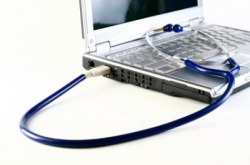American Recovery & Reinvestment Act of 2009

On February 17, President Barack Obama signed the American Recovery and Reinvestment Act of 2009. The Act is intended to achieve widespread adoption of health IT and enable electronic exchange of health information. It offers incentives through Medicare and Medicaid to reward providers for demonstrating the “meaningful use” of certified electronic medical record (EMR) technologies.
The Facts
What is Meaningful Use?
It is not enough to just purchase and implement an EMR system. “Meaningful use” is defined in the legislation as:
Privacy
In addition to these regulations, Congress passed a number of privacy protections designed to safeguard the rights of patients to keep health records private. The Bill:
The Solution
Providers will now need to choose from dozens of technology companies and evaluate which will allow them to seamlessly upgrade to a paperless practice and become a part of the healthcare revolution. There is only one choice, MicroMD, which will give physicians the ability to:
The Facts
- Starting in 2011, meaningful EMR users can earn $44,000 under the Medicare plan and $64,000 under the Medicaid plan over 5 years.
- Early adopters benefit most, as about 70% of the payments come in the first two years.
- Those engaged in Physician Quality Reporting Initiative (PQRI) and electronic prescribing can earn an additional $6,000 - $8,000 per year beginning immediately.
- Physicians that do not adopt an EMR by 2015 will be penalized through percent decreases in Medicare reimbursement rates.
What is Meaningful Use?
It is not enough to just purchase and implement an EMR system. “Meaningful use” is defined in the legislation as:
- Using certified EMR technology that includes electronic prescribing
- Using EMR technology that allows electronic exchanged of health information
- Eligible professionals must submit information for the period on the clinical quality measures and other measures selected by the secretary of the Department of Health and Human Services (HHS).
Privacy
In addition to these regulations, Congress passed a number of privacy protections designed to safeguard the rights of patients to keep health records private. The Bill:
- Prohibits the sale of out medical records without consent. (There are exceptions for research, public health and treatment.)
- Limits marketing
- Requires any entity using an EMR to keep an audit trail of all people and organizations with whom they share your information.
- Mandates policies setting standards for technology systems to segment sensitive information.
- Mandates policies setting standards for encryption of data.
- Increases monetary penalties for violations
The Solution
Providers will now need to choose from dozens of technology companies and evaluate which will allow them to seamlessly upgrade to a paperless practice and become a part of the healthcare revolution. There is only one choice, MicroMD, which will give physicians the ability to:
- Document their patient encounters through use of multiple input methods in less time than it takes today
- Access medical records anywhere, at any time, through a secure internet connection so all of their patient’s doctors can access the record in an emergency in a HIPAA-compliant manner
- Upgrade to a paperless practice with a minimal investment and meet new government guidelines for electronic health records
- Use a revolutionary billing system that allows them to create claims from voice-driven hybrid digital medical records and prepare and submit claims to insurance providers in less than 30 minutes
- Order labs, provide educational material to patients, send prescription requests and earn the full Medicare e-Prescribing bonus payments
- Participate in a virtual community of colleagues and find the right answers faster
- Take advantage of the growing abundance of web services designed to improve their practice
- Be a part of the Internet healthcare revolution



